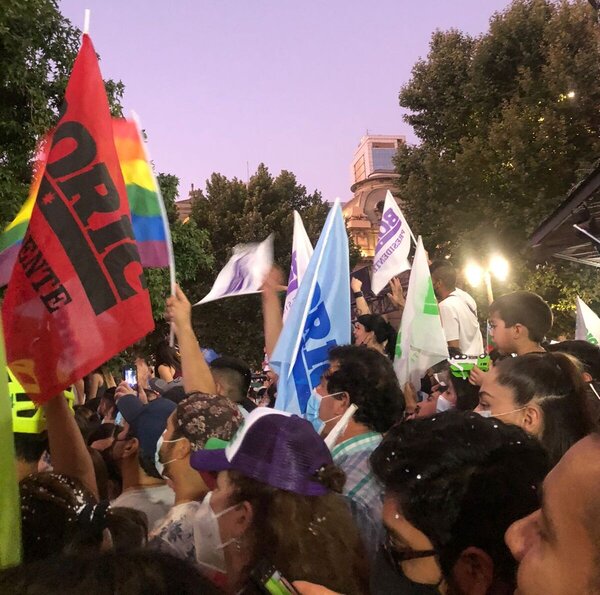Photo: Celebration in Santiago on election night after results were announced. Credit: @fotoencampana
Jose Antonio Kast of the far-right Christian Social Front alliance was defeated by progressive candidate Gabriel Boric in Sunday’s runoff election to become the next president of Chile. Boric will succeed right-wing billionaire president Sebastian Piñera, whose approval ratings had fallen as low as 4.6% following the massive wave of protests that rocked the country in late 2019.
Kast is an avowed supporter of the fascist military regime of Augusto Pinochet, which ruled the country from 1973 to 1990 after being installed in a CIA-orchestrated coup. Interestingly enough, the results were very similar to those of the plebiscite of 1988 that led to the end of Pinochet’s rule: Approximately 44% in favor of continuing the dictatorship in 1988 and voting for Kast today, and about 56% voting against Pinochet in the referendum and for Boric in the present.
One of the main stories coming out of Sunday’s election was the lack of trains and buses to get people to voting sites. About two-thirds of Chileans do not own cars, so the lack of accessible transportation disproportionately impacted working-class neighborhoods in Santiago, where the participation was the highest (59% of the total voting population) and where Boric received 60% of the votes (more than 2 million of the 4.6 million votes for Boric nationwide).
Many people suspected this was a deliberate attempt by Chile’s capitalist class to suppress the vote, as has historically happened. Despite the intentional or unintentional voter suppression, neighbors organized together and those who had vehicles helped by providing free rides to voting sites. The defeat of Kast shows that despite the right wing’s attempt to undermine democracy, the poor and working people of Chile will oppose and struggle against those who wished to bring back a fascist regime.
Elections, capitalist crisis and Conventional Constitution
In order to put an end to the massive 2019 protests that brought millions into the streets and the resulting political radicalization, the ruling classes conceded the creation of a Constitutional Convention to rewrite the country’s constitution. The current constitution was imposed under the Pinochet regime and locked in the neoliberal order, thus preventing substantial transformations to the anti-worker policies enacted during the dictatorship. These have kept the Chilean majority poor and struggling to meet their needs while the rich have maintained their wealth and first world lifestyles, making Chile one of the most unequal countries in the world.
During the civic-military dictatorship, Pinochet attempted to crush all opposition. The Chilean people, including peasants, Indigenous Mapuche communities, workers, shantytowns dwellers, students, women, children, elderly, and leftists were brutally tortured and killed. Trade unions and political parties were banned. After years of militant struggles and resistance, in 1990 the elite-led and U.S.-friendly political coalition called Concertación provided a transitional path towards an unfinished capitalist democracy.
They were able to govern the transition thanks to their alliances with the military, right-wing parties, and the capitalist class. The Concertación, primarily led by the Christian Democratic Party, dominated Chile’s political landscape for the next 20 years. Many Chileans hoped that this new era would reverse some of the most repressive neoliberal economic policies, but it did not happen. Inequalities rose, and economic oppression against the people continued to perpetuate. The Concertación administration developed targeted social programs aimed at the poorest strata of society, but the foundation of the neoliberal system remained.
Despite this era being labeled by capitalist economists as the “Chilean Miracle,” consumption and debt expanded across the population. In reality there was no prosperity. New solutions carried new problems and the fight for a life with dignity was not easy. Life has continued to be a daily struggle for millions of people, only increasing with every crisis. After the 2019 protests, where millions of Chileans struggled in the streets for a better world, the ruling classes decided to contemplate major changes in the state. The referendum for a new constitution is a prime example of this. And it came at a high cost for the people. They suffered brutal state repression — torture, eye mutilations, and until this day there are still many political prisoners.
On Oct. 25, 2020, with 50% participation, Chileans overwhelmingly voted to rewrite the constitution. Seven months later, elections were held to determine the 155 seats in the convention tasked with drafting the new constitution. While Sebastian Piñera’s center-right coalition received more votes than any other coalition, they only gained 20.6% of the seats. The Concertación coalition finished fourth with 14.5% of the vote. The remaining 65% of the vote went to left-wing and independent coalitions and parties.
These results show that in Chile the door is open for new political projects outside the neoliberal status-quo, with all the risks involved. While Boric emerged in the situation as a leading contender, so did the extreme right wing. It reactivated and expanded its bases, strengthening itself to offer a fascist-like solution to the current crisis. The left-leaning electoral trends of 2019 and 2020 were partially reversed in November 2021 — where new and old right-wing forces kept control of almost half of the seats in Congress — and in last weekend’s election, where the extreme-right candidate obtained more than 3.5 million votes. As Gramsci says, “The old world is dying and the new world struggles to be born. Now is the time of monsters.”
Between fascism and progressive reforms
One of the most popular candidates leading up to the 2021 presidential election was the Communist Party of Chile’s nominee Daniel Jadue. Jadue is a Palestinian Chilean and mayor of the City of Recoleta. Some of his campaign policies included providing affordable healthcare and nationalizing Chile’s pension system, copper mines, and water — all of which became privatized under Pinochet’s constitution. Jadue had a strong base of support among Chile’s working class. Jadue’s opponent for the nomination of the left-wing Apruebo Dignidad coalition was Gabriel Boric.
Boric represents the minimum demands from the 2019 protests. A former student union leader and member of Chile’s congress, Boric ran on a campaign of promoting social justice and reducing inequality. However, he has denounced left-wing governments in Latin America, such as Venezuela and Cuba. Additionally, Boric is viewed with suspicion by some participants in the 2019 protests. He voted in favor of a law that punished protesters who set up barricades and signed a peace accord that guaranteed impunity for president Sebastian Piñera. Many analysts argue that right-wing voters participated in the left-wing primary in July in favor of Boric, leading to Daniel Jadue’s upset defeat.
These factors are important to know when understanding the rise of far-right candidate Jose Antonio Kast. Many were surprised when Kast received the most votes in November’s General Election. Possibly more concerning is that the third and fourth place nominees also came from right-wing parties. While mass actions like the 2019 demonstrations and the country’s feminist strikes drew enthusiastic participation by millions, voter turnout was only 47% which allowed Kast to receive 28% of the vote compared to Boric’s 26%. Since no candidate was able to win outright, a runoff election was held Sunday between Kast and Boric.
Kast is the son of German immigrants, including his father who was a Nazi military officer. He is a vocal supporter of the Augusto Pinochet dictatorship, denies human rights violations, opposes same-sex marriage and abortion. A Congressman from Kast’s party caused outrage last month when he expressed doubt that women should have the legal right to vote. Additionally, Kast has been a strong critic of immigration into Chile, particularly in response to recent waves of Haitian and Venezuelan immigrants.
Many media pundits have compared Kast to Donald Trump and Brazil’s Jair Bolsonaro. An important distinction, however, is that Kast is well-spoken and more predictable than Trump and Bolsonaro, giving him more significant support from Chile’s capitalist class. The Western corporate-owned media has been portraying Boric and Kast as equally destructive for “Chilean democracy.” They fear Boric not because his candidacy challenges the national project of capitalism, but because Chile could now join the wave of progressive governments in Latin America after being one of the strongholds of U.S. imperialism. They are uneasy with Kast because of the potential that his presidency would lead to new uprisings and radicalization of the left.
The power lies with the people
If Boric is to fulfil his campaign promises, he will need the support of the popular movement that opened the path to envision a new future in October 2019. He will likely also need the support of other left-wing governments in Latin America such as Bolivia, Peru, Argentina and even those that he has previously denounced like Venezuela and Cuba. Whether his administration will expand substantial rights for the working people, demilitarize the Mapuche people’s land, free political prisoners of the uprising, and challenge U.S. imperialism will be determined in the struggle.
The 2019 protests demonstrated the true power lies with the organized people. Nothing less than the end of the capitalist system itself will solve the crisis facing the working class. The people can accomplish this, with their own mass organizations and revolutionary formations. As Salvador Allende said in his last speech before the 1973 coup that overthrew him, “History is ours, and it is made by the people.”






